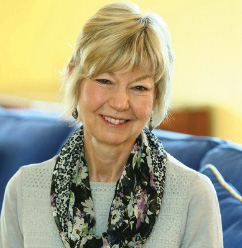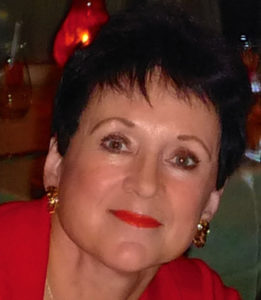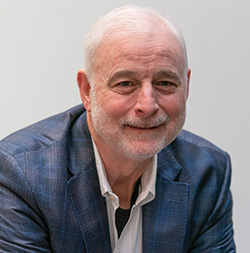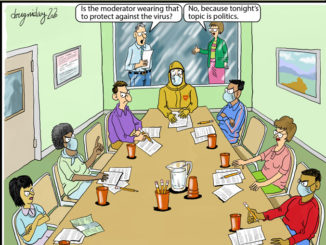Dear Emeritus:
As a qually, I have developed strong moderator skills to help my clients understand and better serve their customers. I often wonder how I can leverage my skills in life outside of research. I have no doubt that there are plenty of opportunities. How have you used the superpower skills you developed as a researcher in your personal life? How have they made a difference in these situations?
—Curious in Cincinnati
Dear Curious:

Jan Lohs Responds
The superpower skill that benefits me most in my personal life is the ability to quickly establish rapport with strangers. This skill involves the ability to easily communicate:
- I see you.
- I value you.
- I want to know you—what you think, how you feel, how you view the world.
- You can feel safe being yourself with me.
From here, rich, authentic conversations can take place.
Although I am no longer a full-time qualitative researcher, I use these abilities to spark interesting, enlightening, and, at times, deeply meaningful conversations with total strangers I encounter in my everyday life. These are not long conversations—maybe just a few minutes. Several have resulted in new friendships.
The trigger for these conversations is my irrepressible passion to make a human connection with people I don’t know. I expect that many quallies relate to this, or, at least, are insatiably curious about what makes people tick.
These conversations teach me that sometimes—or perhaps often—I fall into the trap of making prejudgments, of thinking I’ve got someone figured out, only to discover a totally different person. That’s humbling. I regret not learning these lessons earlier, as I would have been a better research consultant.
Here is an example of a meaningful conversation that I so enjoyed with a young, stern-looking, shaved-head clerk in a Wisconsin cheese shop.
I was a little intimidated. He looked mean. But after a bit of chatting, we discovered we were kindred spirits, both serious oboists, of all things! Jonathan, currently, and me, in an earlier life. We could have talked for hours! We continue our conversations on Facebook.
This type of conversation enriches my soul. It feels like humanity at its best. I hope that, in some small way, the people I speak with feel the same.
Another qually skill that makes these conversations meaningful is patience—waiting during awkward silences. When the conversation lags, let the silence continue rather than filling it with your own voice. The other person will often speak into that silence, and the conversation will move to a deeper level.
Melinda French Gates says it best: “Deep human connection is… the purpose and the result of a meaningful life. And it will inspire the most amazing acts of love, generosity, and humanity.”
Jan Lohs
jan@lohsresearch.com
Dear Curious:

Pat Sabena Responds
The most important skill that translates from being a qualitative researcher to navigating real life is listening well when having conversations with people. Consider the cocktail party where people talk to each other while scanning the rest of the group for a likely contact. For a qually, the difference is concentration on the person or people with whom you’re talking at the moment—and no one else until you all move on.
Eye contact and listening will help you make the connection with the other person. Rushing in with question after question is more likely to annoy than to connect. Disclose a bit of yourself in your conversation, which will allow the other person to also reveal information. Listen with attention, compassion, and comprehension. Build the relationship around the other person to go deeper, as you do in your work. Make each conversation count as real, authentic, and memorable.
Pat Sabena
psabena@qual.com
Dear Curious:

Bob Taylor Responds
Leveraging your superpower skills in your personal life is like being a scuba diver at the bottom of the ocean—if you look carefully, you will discover many treasures.
I have recently discovered three of those treasures:
- Probing: Rather than sharing my point of view, I focus on my family being the “stars” of the conversations. Probing without judgment and acknowledging their input can go a long way to further build trust. My adult daughter recently asked for help in establishing her new business. Part of me wanted to lay out the goals, objectives, strategies, and measures for her, but I chose to allow her to come to these decisions by gently asking probing questions about her purpose and what she wants to accomplish, and I probed on how she wanted to achieve these objectives.
- Sharing the Wealth: I teach marketing research at the University of Arkansas, and like all universities, we have pivoted from face-to-face to a hybrid model with COVID-19, with half of the students attending online. Just like in a focus group (either face-to-face or online), some respondents need encouragement to participate. I leverage my moderating skill set to engage all the students. It is amazing how many remarkable insights the quieter students (or respondents) offer once encouraged to participate.
This semester I had a student who was extremely quiet in class but showed incredible flashes of brilliance. I purposely continued to gently engage her during class and began to see more of those brilliant flashes. As the class research summary project became due, she submitted her paper early and it was dazzling. I received permission to share her work with the balance of the class and saw the “light bulbs” light up in other students on how to tell stories with a complex data set. Net, the quiet student spoke the loudest with her brilliant story.
- Active Listening: I leverage the art of active listening with my adult children. It can be a wonderful technique for summarizing what my children have stated, to verify what is said, to reflect that I am listening, and to empower them to be the experts.
Here’s a story of a valuable listening technique called mirroring. An industrial psychologist I know dreaded going to his spouse’s office events, so he decided it was a great opportunity to sharpen his mirroring techniques. He spent the entire evening mirroring (repeating others in a summary approach) without offering any of his personal points of view. Several attendees independently told his spouse that he “was the most interesting person they had ever spoken with.” Listening empowers others.
Bob Taylor
Dear Curious:

Laurie Tema-Lyn Responds
A technique that I use often in research, but don’t hear others speak about often, is the paraphrase. I find the paraphrase to be a powerful technique: to make sure I have comprehended what someone has said, to call attention to something I believe the backroom clients should pay attention to, or sometimes, to gently remind the respondent that they have said something a bit to the contrary in response to an earlier question.
In life away from work, I find the paraphrase to be just as useful, for similar reasons and more. For example, sometimes the root of an argument is that a remark was simply misunderstood. You just might nip that argument in the bud by saying, “Let me check if I heard you right,” and then restate what you heard. Invite your partner to tell you what parts you got right and what you got wrong!
The paraphrase is the way to say, “I hear you.” I acknowledge you and your right to hold your opinion… even if I may not agree with you. This listening technique can also be a segue to problem solving.
Here’s an example:
- Husband: “I’m tired of Zoom calls. I need to see my sister in Tennessee.”
- Wife: “I want to make sure I understand what you’re saying. You want to see Tracy in person. I get that, but I’m uncomfortable taking a long a trip now. Let’s invite her to visit us.”
- Husband: “I feel that I need to go see her and talk through some issues with her on her turf.”
- Wife: “Can you tell me why it’s important to be at her home?”
- Husband: Gives reasons why.
- Wife: “So, what if we go to a neutral place and meet in a B&B midway?”
- Husband: “Hmm, that’s a possibility. Let me give that more thought.”
No doubt, paraphrasing has eased some marriages or parental exchanges among us researchers.
Laurie Tema-Lyn
laurie@practical-imagination.com
Dear Curious:

Foster Winter Responds
The superpower skill that comes to mind right away is the skill of listening. While I advocate the use of this superpower skill in personal life, I am far from perfect in its application; in fact, I have found listening much easier to apply in my professional life. But I still try, and I find the effort truly worthwhile.
Now, I realize that my natural tendency is to talk rather than listen (my family will back me up on this), and I know I can be easily distracted. Here’s an example that I think many will identify with. In these days where even TV journalists and reporters are working from home, I find myself looking at their bookshelf inventory or wondering where the reporter’s cat is rather than engaging in listening. However, I have a “forced listening” workaround I use in this world of Zoom and Teams calls. In my talent acquisition role on behalf of nonresearch clients, I conduct the first round of candidate interviews. These interviews are conducted on one of the platforms mentioned above, but I use audio only. I listen more attentively because I’m not distracted, and so does the interviewee. Try that on a Zoom call with family or friends and see how much more you’re truly able to listen.
We quallies may refer to our listening skills in terms of being empathetic, dynamic, or active as part of our profession, but our core responsibility is to listen without judgment.
While many of the topics we investigate in our profession are emotionally charged, we strive to remain objective by listening rather than merely hearing. In our personal lives, where discussions and conversations involve our emotions and opinions, it becomes more difficult to do so. Personally, I sometimes have a little internal reminder that says, “Foster, just shut up and listen.” You may not need to be that strident with yourself. That’s not to say you aren’t going to contribute to the discussion, but using your superpower of listening will likely improve the entire experience.
We all have discussions that become arguments that no one will win. Later you think, “I wish I had said…” Perhaps if you had listened—well, you see where I’m going with this. My conversations with my opposing-view son are a constant reminder to work on my personal listening. The fact that he lives 2,000 miles away probably helps me to listen and learn from his perspective. Do I always adopt his point of view? Not necessarily, but that’s not the point. What matters is that I have learned to listen to him, and he can tell that I am really listening. In our relationship, listening to each other makes a difference on so many levels.
Foster Winter




